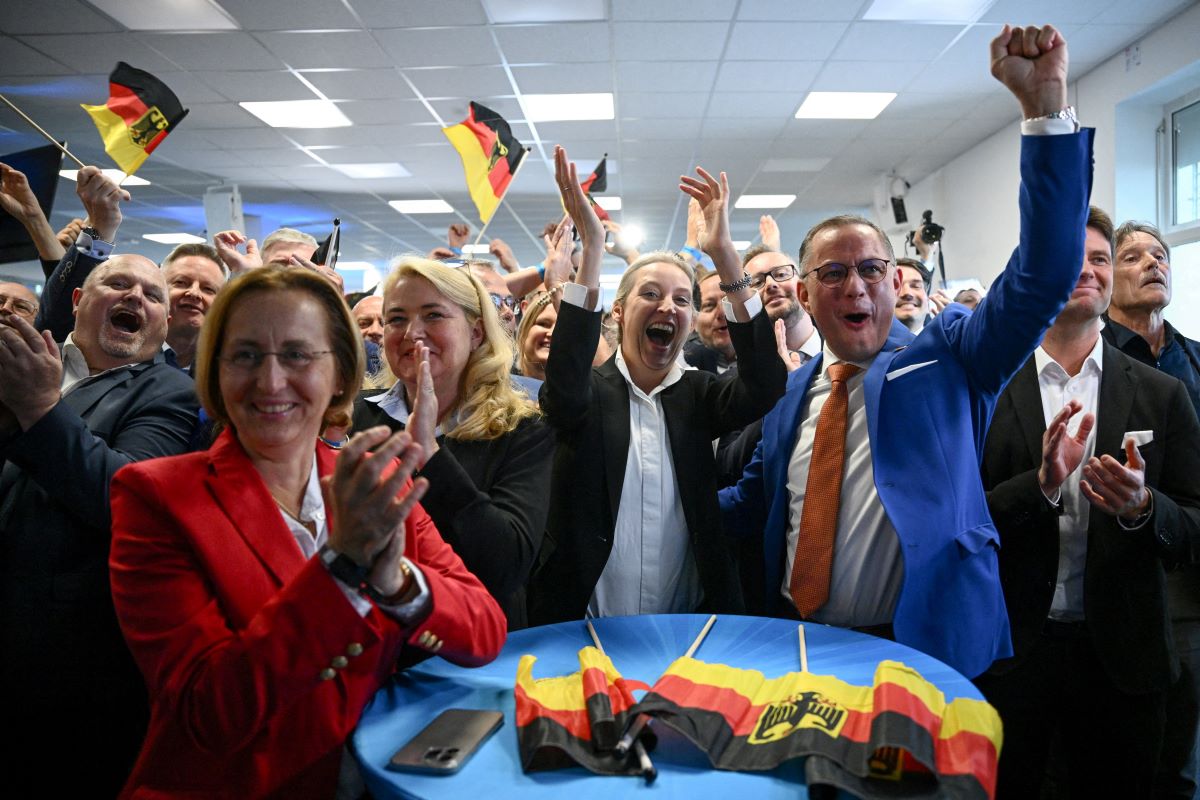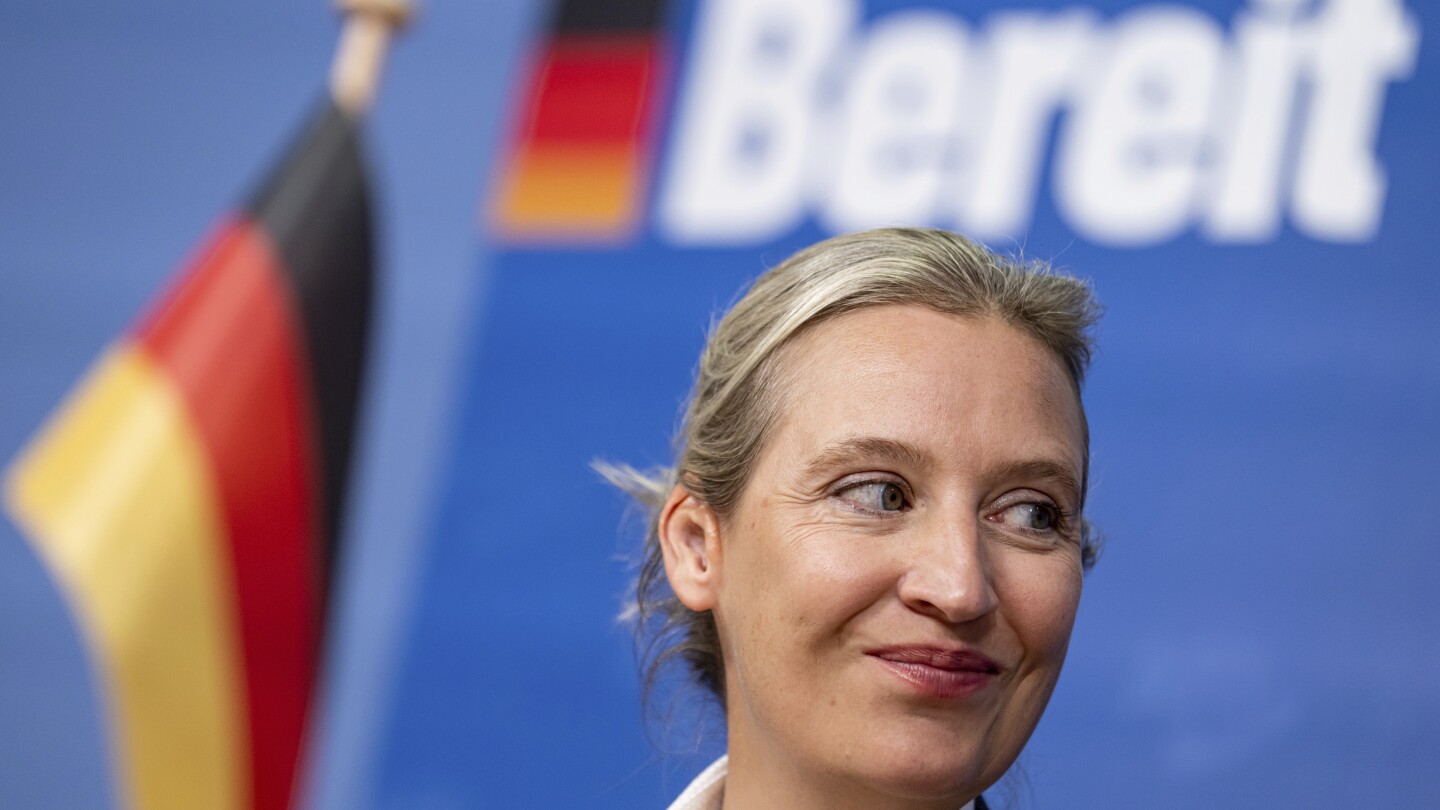Björn Höcke squinted against the bright lights as he scanned the crowd gathered in front of a gothic church in central Cottbus.
With banners proclaiming, “It’s time for real change” and “It’s time to save our country,” the leader of the far-right Alternative für Deutschland (AfD) in Thuringia had arrived for the party’s final rally ahead of a crucial regional election on Sunday—an election that could influence the future of Germany’s government.
Höcke, fresh from an election victory three weeks prior, where his party garnered 33% of the vote, smiled broadly at the audience, addressing them as “fellow patriots.”
“I see a lot of women and young men,” he noted. “It used to be just older white men who were concerned about the future of our beloved German Fatherland. Now everyone realizes they’re affected by the catastrophic policies of the cartel parties.”
The crowd, numbering in the thousands, responded with enthusiasm, waving banners that read, “Fed up to the back teeth” and “Get the red rats out” — a reference to the Social Democrats, who govern Brandenburg and Berlin.
Among the crowd were groups of young men in their 20s, sporting distinctive haircuts and bomber jackets, as well as teenagers like 14- and 15-year-olds Ruben, Willi, Ewell, Kay, and Micah. They had come to see Höcke.
“They’re about to make history,” said Micah, 15, wearing a blue AfD T-shirt and holding a souvenir AfD mug embossed with the slogan, “Somebody has to stay awake.”
He clenched his other hand into a fist and shook it approvingly at Höcke’s words. “We can’t vote yet, but we’re ready for when we can.”
The AfD, narrowly leading the polls ahead of the Social Democrats (SPD), was making a final push in Cottbus, where the party has been the strongest faction in the city parliament since 2019.
With 27% of Brandenburg’s voters still undecided, the campaigning was expected to continue right up to the last minute.
Approximately 2.5 million Brandenburg residents are eligible to vote on Sunday. Although Brandenburg is one of Germany’s smaller states in terms of population, its election is drawing significant national attention due to the expected gains for the far-right AfD.
Three weeks ago, the AfD made headlines by securing the top spot in Thuringia—marking the first time a far-right party had won a state election in post-war Germany—and placing second in neighboring Saxony with over 30% of the vote.
The stakes are high. Höcke, a charismatic speaker known for advocating a reversal of Germany’s culture of Holocaust remembrance, has been classified as a right-wing extremist by the domestic intelligence agency.
Marianne Spring-Räumschüssel, an AfD representative on the Cottbus city council, predicted a “glorious” victory for the AfD, which has led in state polls for over a year. “You can smell it in the air,” she said.
Brandenburg is the only state in eastern Germany where the Social Democrats have ruled continuously since reunification in 1990. The election is seen as a key test for the SPD-led coalition government of Chancellor Olaf Scholz.
According to a recent poll, only 3% of Germans believe the current government is beneficial for the country.

German Far Right Party AfD (Photo: Annegret Hilse)
Brandenburg’s vote is being viewed as a referendum on Scholz’s leadership, and a loss for the SPD would carry deep symbolic significance, especially ahead of next year’s Bundestag election. A poor showing would embarrass the SPD in Berlin and likely weaken Scholz’s support for a second term.
Dietmar Woidke, Brandenburg’s long-serving state leader of 14 years, has raised the stakes even further by pledging to resign if the AfD wins. He has deliberately distanced himself from Scholz during the campaign, even though the chancellor resides in the state capital, Potsdam, with his wife, to avoid any negative impact from Scholz’s unpopularity.
Whether Woidke wins or loses, Scholz is unlikely to emerge unscathed. “If Woidke wins, it will be seen as a result of him distancing himself from Scholz. If he loses, it’ll be viewed as a defeat for Scholz.”
Woidke’s campaign has taken a personal turn, featuring a lighthearted fireside interview where he discussed his pets and music preferences, with the slogan: “Wenn Glatze, dann Woidke” (If you want a skinhead, choose Woidke)—a cheeky reference to his bald head, which contrasts with the Nazi association with shaved heads.
Woidke has also tried to highlight the state’s economic achievements. In Cottbus, about 120 km (75 miles) south of Berlin, these include a new teaching hospital and a planned lakeside leisure complex, part of a multibillion-euro investment to help the region transition away from coal.
At the modern campus of Brandenburg Technical University (BTU), Indian students Twinkle and Kavin, who study World Heritage, and Alwin and Parth, pursuing master’s degrees in Artificial Intelligence, said they were drawn to Cottbus by its resources and lower living costs compared to other German cities.
They only learned about the AfD’s presence and the city’s reputation for right-wing extremism after arriving. “We were quite shocked,” said Twinkle.
“The tone toward foreigners has gotten harsher as the party has grown. We have a WhatsApp group where we warn each other about certain areas, and we take it seriously.”
Kavin added, “We’ve thought about what we’d do if the AfD comes to power. We’d have no choice but to leave.”
Across town, at Chekov, a cultural venue by the River Spree, Robert, one of its supporters, expressed concern that the AfD, which has vowed to cut art subsidies and censor cultural content it deems inappropriate, is already exerting pressure.
“They’re spreading rumors that we’re harboring left-wing terrorists,” he said. “If they cut our funding, it could be an existential threat.”
Robert believes young people, many of whom voted for the AfD in record numbers in Thuringia and Saxony, do not fully grasp the dangers the party poses to German democracy. Höcke’s platform includes eliminating public broadcasting, halting military aid to Ukraine, and rejecting climate change by reverting to fossil fuels.
He also advocates for the party’s “remigration project,” which involves the mass deportation of unwanted foreigners. Rally attendees proudly displayed mugs and stickers emblazoned with the slogan: “Remigration – of course.”
An organizer at Chekov, who used to participate in protests against the far-right, admitted feeling a sense of futility. “We’re not going to change the minds of AfD supporters. Their ideas are too entrenched by now,” he said.
Instead, on the night of the AfD rally, Chekov is hosting its own pre-election event, where attendees will discuss their fears, voting strategies, and how to remain resilient.











































